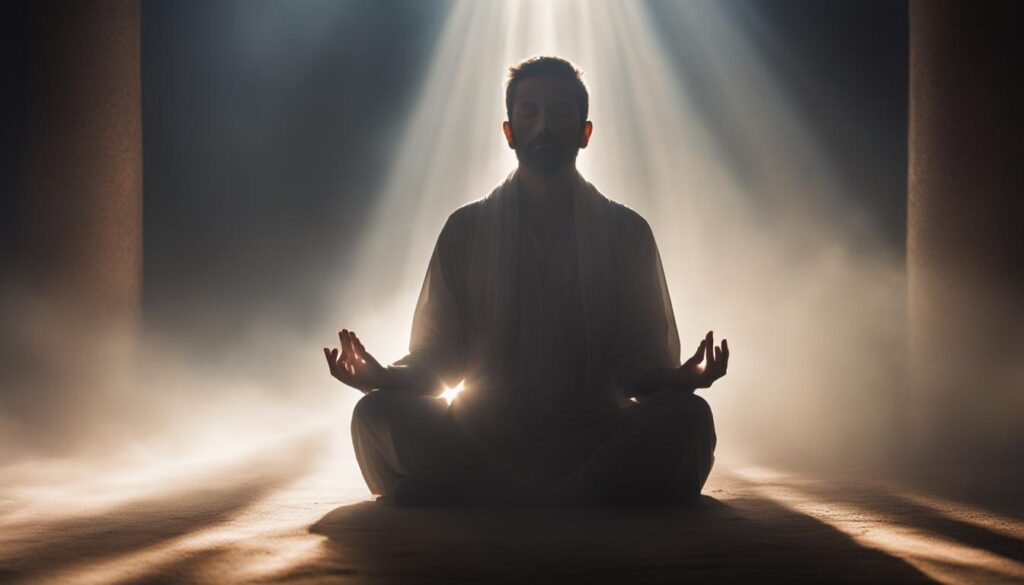When it comes to introspection and reflection, two practices that often come to mind are meditation and prayer. But what exactly is the relationship between the two? Are they similar? Are they different? In this article, we will delve into the world of meditation and prayer, comparing their similarities and differences to help you gain a better understanding of these practices and determine which one resonates with you.
Key Takeaways:
- Prayer and meditation are distinct practices, but they both involve self-reflection and introspection.
- Meditation focuses on being present and cultivating mindfulness, while prayer involves connecting with a higher power and seeking guidance.
- The intention behind prayer is often specific and vocalized, while meditation aims to cultivate inner calm and clarity in silence.
- Both prayer and meditation offer mental health benefits, reducing stress and promoting emotional well-being.
- Choosing between prayer and meditation ultimately depends on personal preference and spiritual beliefs.
What is Meditation?
Meditation is a practice that involves focusing on the present moment and your breath. It encourages mindfulness and allows you to become more aware and centered. By cultivating a regular meditation practice, you can experience increased peace, reduced stress, and improved overall well-being.
Meditation can be performed in various ways, such as sitting or lying down in a comfortable position. The goal is to let go of distracting thoughts and redirect the focus inward. This can be achieved by concentrating on the breath, repeating a mantra, or observing the sensations in the body.
During meditation, the mind naturally wanders, but the practice involves gently returning attention to the present moment without judgment. It is a way of training the mind to be more focused, calm, and resilient. Over time, meditation can help you develop a greater sense of self-awareness, emotional stability, and clarity of mind.

| Benefits of Meditation: | Techniques of Meditation: |
|---|---|
|
|
What is Prayer?
Prayer is a spiritual practice that holds deep significance in various religious traditions. It is a way to communicate with and seek guidance from a higher power, such as God or Allah. Prayer can take different forms, including reciting specific prayers, engaging in private conversations with a divine entity, or participating in communal prayer rituals.
Prayer serves multiple purposes for individuals. It is a means of expressing gratitude for blessings received, seeking forgiveness for one’s actions, and asking for assistance in times of need. Through prayer, believers strengthen their connection to their faith and find solace and comfort in their relationship with the divine.
Prayer holds a special place in religious communities, where it often serves as a unifying force. Group prayer sessions bring people together in shared devotion and reinforce a sense of belonging and community. Prayer can also provide a sense of hope, inspiration, and guidance in navigating life’s challenges.

The Power of Prayer
Prayer has a profound impact on individual well-being, offering spiritual, emotional, and psychological benefits. It provides a sense of peace and calm, allowing individuals to find solace in their faith. Prayer can alleviate stress and anxiety, cultivate a sense of purpose, and foster emotional resilience.
The act of prayer encourages self-reflection and introspection, enabling individuals to connect with their inner selves and align their intentions with divine guidance. It allows for self-improvement, personal growth, and a deeper understanding of one’s purpose in life.
Furthermore, prayer can bring comfort during times of hardship and loss. By surrendering their worries and burdens to a higher power, believers often experience a sense of relief and find strength in their faith. Prayer can also provide a sense of hope and inspire individuals to overcome challenges with renewed determination.
Meditation vs Prayer: What’s the Difference?
While both meditation and prayer have similarities in terms of promoting relaxation and reducing stress, there are notable differences between the two practices. Understanding these differences can help you determine which practice aligns best with your personal beliefs and goals.
Connecting with the Divine vs Connecting with Oneself
One significant difference between meditation and prayer lies in the focus of connection. Prayer involves connecting with a higher divine power such as God or Allah. It is a means of seeking guidance, expressing gratitude, and seeking assistance.
On the other hand, meditation is centered around connecting with oneself. It is a practice of clearing the mind of distractions, cultivating inner calm, and finding clarity. The focus is on self-reflection and gaining a deeper understanding of one’s own thoughts, emotions, and experiences.
Intention and Purpose
The intention behind prayer and meditation also differs. Prayer often involves vocalizing specific desires, asking for forgiveness, or seeking intervention from a higher power. It can be a way of expressing devotion, surrendering to a greater authority, and seeking comfort during challenging times.
In contrast, meditation is more about being present in the moment and cultivating mindfulness. The intention is to observe and accept thoughts and sensations without judgment. It is a practice of self-awareness and self-discovery, aiming to bring about inner peace and a deeper connection with oneself and the world.
Mode of Expression
Another distinction between prayer and meditation lies in how they are vocalized. Prayer typically involves the use of spoken words and can take the form of recited prayers, chants, or conversations with a higher power. It often involves external vocalization and may be done individually or in a group setting.
On the other hand, meditation is practiced in silence. There is no vocalization of thoughts or intentions. Instead, the focus is on quieting the mind, observing thoughts without attachment, and finding stillness within. It can be practiced individually or in a group setting where participants engage in silent meditation together.

| Prayer | Meditation | |
|---|---|---|
| Focus | Connecting with a higher divine power | Connecting with oneself |
| Intention | Expressing gratitude, seeking guidance, and asking for assistance | Being present, cultivating mindfulness, and finding inner peace |
| Mode of Expression | Vocalization through spoken words | Silence, no vocalization of thoughts or intentions |
Who You Connect With
When it comes to prayer and meditation, one key difference lies in who you connect with during these practices. Prayer involves connecting with a higher divine power, such as God or Allah, seeking guidance and support. It is an opportunity to establish a spiritual connection and express gratitude, share thoughts, and seek assistance from a higher being.
On the other hand, meditation focuses on connecting with oneself. It is a practice of introspection and self-reflection, aiming to clear the mind and find inner calm and clarity. Through meditation, individuals seek to cultivate a deeper understanding of their own thoughts, emotions, and sensations, without the necessity of connecting to a higher power.
Both prayer and meditation offer their own unique benefits, allowing individuals to connect with something greater than themselves or find inner peace and clarity within. The choice between prayer and meditation depends on personal beliefs, preferences, and the desired outcome of the practice.

Connecting with the Divine through Prayer and Meditation
Prayer and meditation can both provide solace, comfort, and a sense of connection, but they do so in different ways. Prayer is a way to reach out to a higher power and establish a relationship or seek guidance, while meditation is a means of looking inward to better understand oneself. Both practices can be valuable tools for personal growth and well-being, offering unique ways to connect with the divine or find inner peace and clarity.
Mental Health Benefits of Prayer and Meditation
Both prayer and meditation offer numerous mental health benefits, providing individuals with relaxation, stress relief, and improved emotional well-being. These practices are powerful tools that can enhance self-awareness, cultivate mindfulness, and promote overall mental clarity.
Prayer, with its focus on connecting with a higher power, brings a sense of hope and comfort during difficult times. It allows individuals to express gratitude, seek forgiveness, and ask for guidance and support. This act of surrendering one’s worries to a divine entity can reduce anxiety and provide a deep sense of peace.
Meditation, on the other hand, encourages individuals to be present in the moment, to observe their thoughts without judgment, and to cultivate acceptance. By practicing mindfulness through meditation, individuals can learn to quiet their minds, reduce stress, and improve their emotional well-being. Regular meditation can also enhance concentration and focus, allowing for greater mental clarity in daily life.
Both practices, prayer, and meditation, can be used as effective tools for relaxation and stress relief. Incorporating prayer and meditation into daily life can contribute to a balanced, centered, and resilient mental state. It is important to explore these practices and find what resonates with you, as they can provide significant benefits to emotional well-being and overall mental health.
A Unique Intention
In exploring the differences between prayer and meditation, one notable distinction lies in their unique intentions. While both practices involve introspection and reflection, their underlying purposes differ.
Prayer, often rooted in religious beliefs, is a means of expressing gratitude, seeking forgiveness, and requesting specific outcomes or assistance from a higher power. It is an act of communication with the divine, channeling faith and hope.
Meditation, on the other hand, focuses on being present and cultivating mindfulness in everyday life. Rather than seeking external intervention, meditation encourages individuals to connect with their inner selves, seeking clarity, peace, and a heightened sense of awareness.
“Prayer is when you speak to God; meditation is when you listen to God.” – Diana Robinson
By recognizing the unique intentions behind prayer and meditation, individuals can choose the practice that aligns with their personal beliefs, goals, and spiritual inclinations.
How It’s Vocalized
One of the key differences between prayer and meditation lies in how they are vocalized. In prayer, individuals typically use spoken words to address a higher power, expressing their gratitude, seeking forgiveness, and making specific requests. This vocalization allows for a direct form of communication with the divine.
In contrast, meditation is a practice that is observed in silence, without the vocalization of thoughts or intentions. It involves finding inner calm and clarity by focusing on the present moment and clearing the mind. By eliminating verbal expression, meditation encourages individuals to turn inward and develop a deep sense of self-awareness.
While prayer relies on spoken words to communicate with a higher power, meditation emphasizes the power of silence and introspection. Both practices have their unique benefits and can be enhanced through the use of guided meditation apps or group prayer sessions.
Table: Prayer and Meditation – A Comparison
| Aspect | Prayer | Meditation |
|---|---|---|
| Connection | Connecting with a higher power | Connecting with oneself |
| Intention | Expressing gratitude, seeking forgiveness, making requests | Cultivating mindfulness, being present |
| Vocalization | Spoken words addressing a higher power | Practiced in silence |
| Benefits | Hope, comfort, emotional support | Reduced stress, increased self-awareness |
While prayer and meditation serve distinct purposes, they both offer individuals an opportunity for self-reflection, inner growth, and spiritual connection. Whether vocalizing your thoughts or embracing silence, finding a practice that resonates with you can bring about a profound sense of peace and well-being.
Conclusion
Incorporating prayer and meditation into your daily practice can have a profound impact on your overall well-being. Both practices offer unique benefits and can provide a sense of peace, connection, and spiritual growth.
Prayer allows you to connect with a higher power, express gratitude, seek guidance, and find comfort in difficult times. It offers hope and a sense of support when navigating through life’s challenges. On the other hand, meditation focuses on connecting with yourself, cultivating mindfulness, and finding inner calm and clarity. By practicing meditation, you can become more present, reduce stress, and improve your overall mental well-being.
Whether you choose to engage in prayer, meditation, or both, finding a practice that resonates with you is key. Consider incorporating a daily prayer or meditation routine, even if it’s just a few minutes each day. The power of prayer and meditation lies in their ability to provide a sanctuary of peace amidst the chaos of everyday life.
Take the time to explore and experiment with prayer and meditation techniques that align with your beliefs and goals. Remember, the journey towards spiritual growth and self-discovery is unique to each individual. Embrace the power of prayer and meditation as tools for personal transformation and enjoy the profound benefits they can bring to your life.
FAQ
Is prayer a form of meditation?
While both prayer and meditation involve introspection and reflection, they are distinct practices with some differences. Prayer is a religious act that involves connecting with a higher power, while meditation focuses on connecting with oneself and finding inner calm and clarity.
What is meditation?
Meditation is a practice that involves focusing on the present moment and your breath. It encourages mindfulness and allows you to become more aware and centered. By cultivating a regular meditation practice, you can experience increased peace, reduced stress, and improved overall well-being.
What is prayer?
Prayer is a religious act that involves connecting with a higher power, such as God. It is a means of expressing gratitude, seeking guidance, and asking for assistance. Each religion has its own specific prayers and rituals that followers engage in to deepen their spiritual connection.
What’s the difference between meditation and prayer?
Meditation and prayer have similarities in promoting relaxation and reducing stress, but they differ in who you connect with, the intention behind the practice, and the vocalization of thoughts and intentions. Meditation is about connecting with oneself and cultivating mindfulness, while prayer involves connecting with a higher power and seeking guidance and support.
Who do you connect with in prayer and meditation?
In prayer, you connect with a higher divine power, such as God or Allah, seeking guidance and support. In meditation, the focus is on connecting with oneself, clearing the mind to find inner calm and clarity.
What are the mental health benefits of prayer and meditation?
Both prayer and meditation offer mental health benefits. Prayer provides hope and a sense of comfort in times of difficulty, while meditation cultivates acceptance and mindfulness. Both practices can reduce stress, promote emotional well-being, and improve overall mental clarity.
What is the unique intention of prayer and meditation?
The intention behind prayer is often focused on expressing gratitude, seeking forgiveness, and asking for specific outcomes. Meditation, on the other hand, is more about being present and cultivating mindfulness in everyday life.
How are thoughts vocalized in prayer and meditation?
Prayer is typically vocalized through spoken words addressed to a higher power. In contrast, meditation is practiced in silence, without vocalizing thoughts or intentions. Both practices can be enhanced with the use of guided meditation apps or group prayer sessions.
How can prayer and meditation be incorporated into daily life?
Prayer and meditation are powerful practices that can be incorporated into daily life. Whether you choose to engage in prayer, meditation, or both, they can provide a sense of peace, connection, and spiritual growth. The benefits of prayer and meditation are numerous, and finding a practice that resonates with you can have a profound impact on your well-being.








